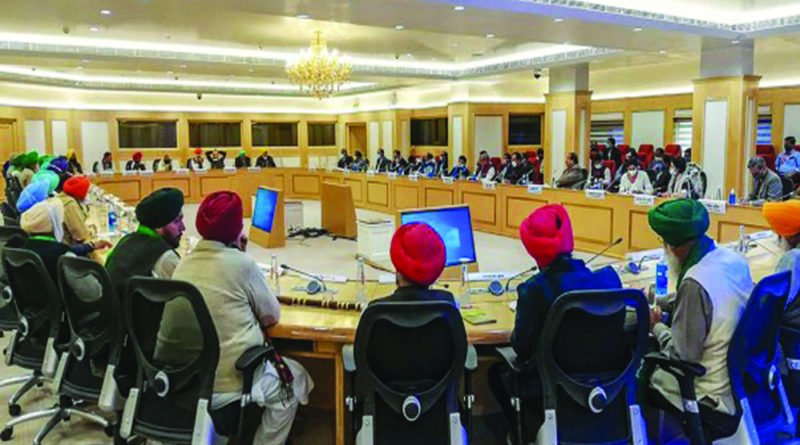Talks at last
The farmers have managed to keep politicians at bay from their movement, fought on their own and forced an agenda on the Govt
The farmers have made their point about their anxieties over the new farm laws enacted by the Modi Government and forced the latter into negotiations. And they want a result and no further confabulations with committees that may just dilute their cause. To that extent they have been successful but shouldn’t let the situation drift endlessly and egoistically. Hopefully, the Government will at least spell out the details of the new laws, which are broadly in the domain of interpretation at the moment, where the devil is in the detail and which are largely gestational. We must give it to the farmers that they have forced the need for clarity and a point by point analysis of consequences though their dramatic agitprops may not have been endorsed by all. Yet without them, they wouldn’t have got the high table. It is also an opportunity for the Government to justify its farm liberalisation agenda, its long-term, reformist impact and rid itself of the charges of selling out to corporations. Politically, the ruling BJP had not expected to be cornered like this by a movement spearheaded by a majority of farmers’ organisations, which kept their agitation largely apolitical. In fact, this is probably the first of its kind dissent movement that has shunned politicians, though the latter have tried to latch on to it, considering the agricultural community forms 60 per cent of the voting population. Activists, sportspersons and celebrities from across the spectrum, too, have thrown their weight behind it but the momentum of the past few months, the strategy to waylay the Government with civil disruptions and refusal to budge from core issues without reassurance have been the result of farmers’ unions bandying together. The Government may claim that the new farm laws will help farmers with open markets, pick-ups from farm gate, better prices and partnerships with food majors, particularly elevating the lot of smaller cultivators. But the farmers fear free market forces will deprive them of guaranteed minimum prices for their produce and reduce the level-playing field of Government mandis. Besides, smaller farmers that the laws intend to rescue could be exploited and browbeaten by large corporations. And while the Prime Minister may assure that both the old and new models could work together, farmers are not entirely wrong in anticipating that the swamp of corporatisation could decimate the parallel, protected market. The examples of contract farming failing in the sugarcane sector, with farmers still chasing their dues, and PepsiCo suing farmers in Gujarat are difficult to ignore. Considering the food bowl in North India is mostly affected by the MSP issue, given its reliance on cash crops of wheat and paddy, the Government has realised that it cannot get away by passing the blame of the agitation on the Opposition or the Left liberals.
Particularly, when its own allies are attacking it over the new laws and its key partner in Punjab, the Shiromani Akali Dal (SAD), has already walked out. The BJP may not need its allies anymore, given its own numerical strength in Parliament, but with more of them threatening to leave the fold, it runs the risk of being labelled an absolutist that shuns the morality of a coalition dharma or refuses to answer tough questions. The farmers’ issue has undoubtedly also given a reason for the BJP’s allies to make themselves heard and not be taken for granted. The latest to insist upon a clarity on MSP is Jannayak Janata Party (JJP), which is partnering the Manohar Lal Khattar Government in Haryana and whose leader Dushyant Chautala is the Deputy Chief Minister. His father and senior leader Ajay Chautala said the BJP should be accommodative of farmers’ interests than running roughshod over them. At the same time, an independent MLA, Somvir Sangwan, pulled out of the State’s ruling coalition. And in Rajasthan, Nagaur MP and leader of the Rashtriya Loktantrik Party (RLP), Hanuman Beniwal, said he would reconsider his party’s support to the Centre if the new laws are not withdrawn. Parties like the JJP are caught between a rock and a hard place. Dushyant Chautala, particularly, draws his strength from the youth and farmers and knows that he can deliver by being part of governance. It is for this reason that he cannot walk out of the coalition. Yet the new laws hurt his constituency the most. Should the JJP withdraw on moral grounds, the BJP can run the Haryana Government with Independents and even attempt to break the JJP. Anyway Dushyant’s post-poll alliance with the BJP, despite campaigning against it during the polls, was an unhappy deal intended purely to have a say in Government. The Haryana elections are still some four years away but the party is using the farmers’ agitation to step up its rhetoric and test popular response. If the controversy over the farm laws is resolved, it can always claim it forced the issue on its alliance partner. If not, it can always claim that it had taken a high moral ground by joining issue with the farmers. Perhaps that’s the reason why Ajay Chautala, and not Dushyant, is taking an activist position. Unlike the SAD, which cannot appear anti-farmer with the Punjab Assembly elections in 2022, the JJP has time to weigh the pros and cons. At the moment, its core base of Jats and farmers are angry. But should the laws yield rich dividends eventually, JJP would be strengthened. The BJP could turn this around to its advantage by at least assuring the farmers of some protection against price fluctuations, if not yield on the MSP, considering that runs counter to the privatisation implicit in the new laws. It can also put out its own narrative of how liberalisation would hurt incomes of richer, well-connected farmers as well as affect State Government revenues, which is why politicians in Punjab are protesting so loudly compared to marginal farmers in other States. But in the end, it has to do this through a consultative, not a confrontationist, approach. It doesn’t harm to give a listen. It doesn’t weaken authority either.
Source: The PIoneer




